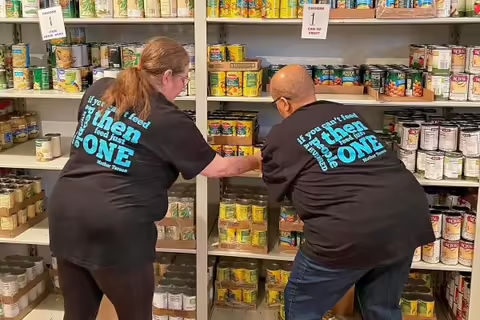CANTON, Ill. - Health and wellness involves more than just nutrition education. People may know the “right foods” to eat or the “bad foods” to avoid, but availability and affordability can also be deciding factors. Recently First Baptist Church Food Pantry (FBC) in Canton worked with University of Illinois Extension Supplemental Nutrition Assistance Program—Education (SNAP-Education) staff to write and implement a nutrition policy that is another layer in their approach to support the health and wellness of their community.
“We first began working with First Baptist Church Food Pantry in 2018,” explained SNAP-Education Program Coordinator Rebecca Crumrine. “Our SNAP-Education instructors provide education, food samples and recipes to guests, while I work with the pantry manager to help create an environment that supports utilizing the nutrition education.”
Within U of I Extension, the work Crumrine mentioned she does is referred to as Policy, Systems, and Environment (PSE) programs. Other examples of PSE work that have happened at FBC are when SNAP-Ed provided technical assistance as the pantry made the move to a client choice or shopping style layout plus the various supplies needed to enhance the environment and point families towards foods that support their health (educational posters, recipe card holders, etc.)
“We know that guests want more healthy food options,” Crumrine stated. “Research has been done nationally as well as locally showing the top three requested food items being fruits, vegetables, and lean meat. The new nutrition policy at FBC will help guide the pantry towards increasing important foods, as well as potential foods to divert. The policy also works to define those foods.”
Elexus Hampton, SNAP-Education instructor has become a familiar face to the FBC food pantry guests. As the pantry provides new, healthy food options Elexus is there to provide recipes and education about those foods and more. She connects with over 100 people during her monthly program at the pantry.
“Some of my recent Eat.Move.Save booth topics included dry beans and lentils; healthy snacks; limiting added sugars; and physical activity,” Elexus commented. “I have paired these with a number of different recipes from Blueberry Bean Cakes to Chicken and Vegetable Chowder. I offer samples and visit with people about how they might adjust or ‘amp’ up the recipe when they make it at home.”
The 12-member SNAP-Ed team serving in Fulton, Mason, Peoria, and Tazewell counties works hard and creatively to reach people where they are. Changes like those implemented by FBC take time, and SNAP-Ed staff are happy to help organizations make sustainable, long lasting changes that will help our SNAP eligible families.
SOURCE: Rebecca Crumrine, SNAP-Education program coordinator and Elexus Hampton, SNAP-Education instructor
ABOUT EXTENSION: Illinois Extension leads public outreach for University of Illinois by translating research into action plans that allow Illinois families, businesses, and community leaders to solve problems, make informed decisions, and adapt to changes and opportunities.
